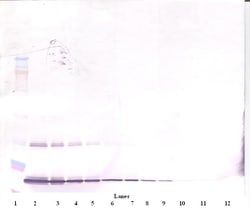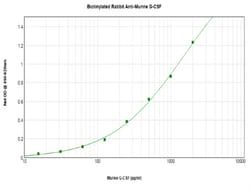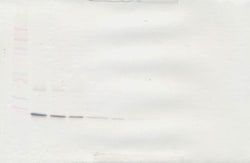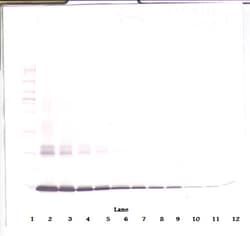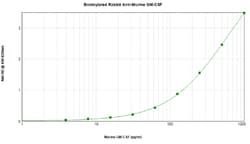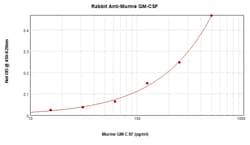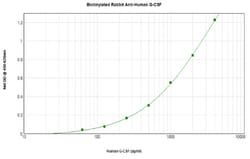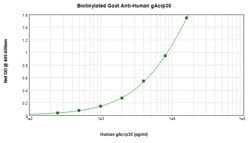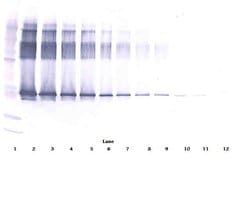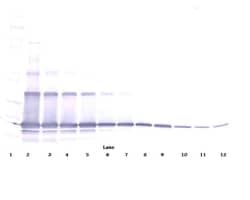7245429
G-CSF Polyclonal Antibody, Biotin, PeproTech®, Invitrogen™
Rabbit Polyclonal Antibody
Manufacturer: Fischer Scientific
The price for this product is unavailable. Please request a quote
Antigen
G-CSF
Applications
ELISA, Western Blot
Conjugate
Biotin
Host Species
Rabbit
Target Species
Human
Gene Accession No.
P09919
Gene ID (Entrez)
1440
Immunogen
E.coli-derived Recombinant Human G-CSF
Purification Method
Antigen affinity chromatography
Gene
Csf3
Concentration
0.1-1.0 mg/mL
Classification
Polyclonal
Form
Lyophilized
Regulatory Status
RUO
Formulation
PBS with no preservative
Gene Alias
C17orf33; colony stimulating factor 3; colony stimulating factor 3 (granulocyte); CSF 3; CSF3; CSF3OS; Csfg; filgrastim; GCSF; G-CSF; Granulocyte colony-stimulating factor; granulocyte-colony stimulating factor; gsf3; lenograstim; MGC45931; MGI-IG; Pluripoietin; RP23-395E10.4
Gene Symbols
Csf3
Primary or Secondary
Primary
Content And Storage
-20°C
Description
- AA Sequence of recombinant protein: TPLGPASSLP QSFLLKCLEQ VRKIQGDGAA LQEKLCATYK LCHPEELVLL GHSLGIPWAP LSSCPSQALQ LAGCLSQLHS GLFLYQGLLQ ALEGISPELG PTLDTLQLDV ADFATTIWQQ MEELGMAPAL QPTQGAMPAF ASAFQRRAGG VLVASHLQSF LEVSYRVLRH LAQP
- Preparation: Produced from sera of rabbits immunized with highly pure Recombinant Human G-CSF
- Anti-Human G-CSF-specific antibody was purified by affinity chromatography and then biotinylated
- Sandwich ELISA: To detect hG-CSF by sandwich ELISA (using 100 μL/well antibody solution) a concentration of 0.25-1.0 μg/mL of this antibody is required
- This biotinylated polyclonal antibody, in conjunction with PeproTech Polyclonal Anti-Human G-CSF (500-P43) as a capture antibody, allows the detection of at least 0.2-0.4 ng/well of Recombinant hG-CSF
- Western Blot: To detect hG-CSF by Western Blot analysis this antibody can be used at a concentration of 0.1-0.2 μg/mL
- Used in conjunction with compatible secondary reagents the detection limit for Recombinant hG-CSF is 1.5-3.0 ng/lane, under either reducing or non-reducing conditions
- 500-P43BT-1MG will be provided as 2 x 500 μg G-CSF (Granulocyte colony stimulating factor) is a naturally occurring cytokine that stimulates the production and antibacterial function of neutrophils and monocytes
- Human G-CSF is an 18.8 kDa protein containing 175 amino acid residues, and a soluble isoform of the G-CSF receptor has been described
- The pleotropic cytokine is produced by activated monocytes, macrophages, endothelial cells, fibroblasts, astrocytes, osteoblasts and bone marrow cells
- G-CSF has been shown to have specific effects on the proliferation, differentiation and activation of hematopoietic cells
- G-CSF is also expressed by various transformed cells such as carcinoma cells and myeloblastic leukemia cells
- G-CSF is encoded by two distinct DNA sequences, resulting in a full size, high activity and a shorter, low activity isoform of G-CSF
- G-CSF is highly conserved among species and has been shown to exert its biological functions through interaction with its receptor expressed on the surface of hematopoietic progenitors, neutrophilic granulocytes and certain carcinoma cell lines
- Clinical use of G-CSF has been approved for several therapeutic applications, treatment of neonatal infections, therapy of acute myocardial infarction, granulocyte transfusion in patients with neutropenia, in severe infections and sepsis, therapy in chronic autoimmune neutropenia, treatment of acute myeloid leukemias, Sweet's syndrome and AIDS
- Further, G-CSF has been shown to be a marker protein for different carcinomas such as bladder cancer and dysfunction of the protein has been linked to Kostmann Syndrome.
Compare Similar Items
Show Difference
Antigen: G-CSF
Applications: ELISA, Western Blot
Conjugate: Biotin
Host Species: Rabbit
Target Species: Human
Gene Accession No.: P09919
Gene ID (Entrez): 1440
Immunogen: E.coli-derived Recombinant Human G-CSF
Purification Method: Antigen affinity chromatography
Gene: Csf3
Concentration: 0.1-1.0 mg/mL
Classification: Polyclonal
Form: Lyophilized
Regulatory Status: RUO
Formulation: PBS with no preservative
Gene Alias: C17orf33; colony stimulating factor 3; colony stimulating factor 3 (granulocyte); CSF 3; CSF3; CSF3OS; Csfg; filgrastim; GCSF; G-CSF; Granulocyte colony-stimulating factor; granulocyte-colony stimulating factor; gsf3; lenograstim; MGC45931; MGI-IG; Pluripoietin; RP23-395E10.4
Gene Symbols: Csf3
Primary or Secondary: Primary
Content And Storage: -20°C
Antigen:
G-CSF
Applications:
ELISA, Western Blot
Conjugate:
Biotin
Host Species:
Rabbit
Target Species:
Human
Gene Accession No.:
P09919
Gene ID (Entrez):
1440
Immunogen:
E.coli-derived Recombinant Human G-CSF
Purification Method:
Antigen affinity chromatography
Gene:
Csf3
Concentration:
0.1-1.0 mg/mL
Classification:
Polyclonal
Form:
Lyophilized
Regulatory Status:
RUO
Formulation:
PBS with no preservative
Gene Alias:
C17orf33; colony stimulating factor 3; colony stimulating factor 3 (granulocyte); CSF 3; CSF3; CSF3OS; Csfg; filgrastim; GCSF; G-CSF; Granulocyte colony-stimulating factor; granulocyte-colony stimulating factor; gsf3; lenograstim; MGC45931; MGI-IG; Pluripoietin; RP23-395E10.4
Gene Symbols:
Csf3
Primary or Secondary:
Primary
Content And Storage:
-20°C
Antigen: Adipolean (gAcrp30)
Applications: ELISA, Western Blot
Conjugate: Biotin
Host Species: Goat
Target Species: Human
Gene Accession No.: Q15848
Gene ID (Entrez): 9370
Immunogen: E.coli-derived Recombinant Human gAcrp30/Adipolean
Purification Method: Antigen affinity chromatography
Gene: ADIPOQ
Concentration: 0.1-1.0 mg/mL
Classification: Polyclonal
Form: Lyophilized
Regulatory Status: RUO
Formulation: PBS with no preservative
Gene Alias: gAcrp30
Gene Symbols: ADIPOQ
Primary or Secondary: Primary
Content And Storage: -20°C
Antigen:
Adipolean (gAcrp30)
Applications:
ELISA, Western Blot
Conjugate:
Biotin
Host Species:
Goat
Target Species:
Human
Gene Accession No.:
Q15848
Gene ID (Entrez):
9370
Immunogen:
E.coli-derived Recombinant Human gAcrp30/Adipolean
Purification Method:
Antigen affinity chromatography
Gene:
ADIPOQ
Concentration:
0.1-1.0 mg/mL
Classification:
Polyclonal
Form:
Lyophilized
Regulatory Status:
RUO
Formulation:
PBS with no preservative
Gene Alias:
gAcrp30
Gene Symbols:
ADIPOQ
Primary or Secondary:
Primary
Content And Storage:
-20°C
Antigen: Serpina12
Applications: ELISA, Western Blot
Conjugate: Biotin
Host Species: Rabbit
Target Species: Human
Gene Accession No.: Q8IW75
Gene ID (Entrez): 145264
Immunogen: E.coli-derived, 45.2 kDa Recombinant Human Vaspin
Purification Method: Antigen affinity chromatography
Gene: SERPINA12
Concentration: 0.1-1.0 mg/mL
Classification: Polyclonal
Form: Lyophilized
Regulatory Status: RUO
Formulation: PBS with no preservative
Gene Alias: 4632419J12Rik; a12; Ol64; Ol-64; serine (or cysteine) peptidase inhibitor, clade A (alpha-1 antiproteinase, antitrypsin), member 12; serine (or cysteine) peptidase inhibitor, clade A, member 12; serine (or cysteine) proteinase inhibitor, clade A (alpha-1 antiproteinase, antitrypsin), member 12; serpin A12; serpin family A member 12; serpin peptidase inhibitor, clade A (alpha-1 antiproteinase, antitrypsin), member 12; serpin peptidase inhibitor, clade A, member 12; Serpina12; Vaspin; visceral adipose tissue-derived serine protease inhibitor; visceral adipose tissue-derived serpin; visceral adipose-specific serpin
Gene Symbols: SERPINA12
Primary or Secondary: Primary
Content And Storage: -20°C
Antigen:
Serpina12
Applications:
ELISA, Western Blot
Conjugate:
Biotin
Host Species:
Rabbit
Target Species:
Human
Gene Accession No.:
Q8IW75
Gene ID (Entrez):
145264
Immunogen:
E.coli-derived, 45.2 kDa Recombinant Human Vaspin
Purification Method:
Antigen affinity chromatography
Gene:
SERPINA12
Concentration:
0.1-1.0 mg/mL
Classification:
Polyclonal
Form:
Lyophilized
Regulatory Status:
RUO
Formulation:
PBS with no preservative
Gene Alias:
4632419J12Rik; a12; Ol64; Ol-64; serine (or cysteine) peptidase inhibitor, clade A (alpha-1 antiproteinase, antitrypsin), member 12; serine (or cysteine) peptidase inhibitor, clade A, member 12; serine (or cysteine) proteinase inhibitor, clade A (alpha-1 antiproteinase, antitrypsin), member 12; serpin A12; serpin family A member 12; serpin peptidase inhibitor, clade A (alpha-1 antiproteinase, antitrypsin), member 12; serpin peptidase inhibitor, clade A, member 12; Serpina12; Vaspin; visceral adipose tissue-derived serine protease inhibitor; visceral adipose tissue-derived serpin; visceral adipose-specific serpin
Gene Symbols:
SERPINA12
Primary or Secondary:
Primary
Content And Storage:
-20°C
Antigen: RANKL (soluble)
Applications: ELISA, Western Blot
Conjugate: Unconjugated
Host Species: Goat
Target Species: Human
Gene Accession No.: O14788
Gene ID (Entrez): 8600
Immunogen: E.coli-derived Recombinant Human sRANK Ligand
Purification Method: Antigen affinity chromatography
Gene: TNFSF11
Concentration: 0.1-1.0 mg/mL
Classification: Polyclonal
Form: Lyophilized
Regulatory Status: RUO
Formulation: PBS with no preservative
Gene Alias: CD254; H-RANK-L; hRANKL2; Ly109l; M-Rank-L; ODF; OPG; OPG ligand; OPGL; OPTB2; Osteoclast differentiation factor; osteoprotegerin ligand; Rankl; rank-l; receptor activator of NF-kappaB ligand; receptor activator of nuclear factor kappa B ligand; receptor activator of nuclear factor kappa-B ligand; RP11-86N24.2; sOdf; srankl; TNF-related activation-induced cytokine; Tnfsf11; TNLG6B; Trance; tumor necrosis factor (ligand) superfamily member 11; tumor necrosis factor (ligand) superfamily, member 11; tumor necrosis factor ligand 6B; tumor necrosis factor ligand superfamily member 11; Tumor necrosis factor ligand superfamily member 11, membrane form; Tumor necrosis factor ligand superfamily member 11, soluble form; tumor necrosis factor superfamily member 11; tumor necrosis factor-related activation-induced cytokine
Gene Symbols: TNFSF11
Primary or Secondary: Primary
Content And Storage: -20°C
Antigen:
RANKL (soluble)
Applications:
ELISA, Western Blot
Conjugate:
Unconjugated
Host Species:
Goat
Target Species:
Human
Gene Accession No.:
O14788
Gene ID (Entrez):
8600
Immunogen:
E.coli-derived Recombinant Human sRANK Ligand
Purification Method:
Antigen affinity chromatography
Gene:
TNFSF11
Concentration:
0.1-1.0 mg/mL
Classification:
Polyclonal
Form:
Lyophilized
Regulatory Status:
RUO
Formulation:
PBS with no preservative
Gene Alias:
CD254; H-RANK-L; hRANKL2; Ly109l; M-Rank-L; ODF; OPG; OPG ligand; OPGL; OPTB2; Osteoclast differentiation factor; osteoprotegerin ligand; Rankl; rank-l; receptor activator of NF-kappaB ligand; receptor activator of nuclear factor kappa B ligand; receptor activator of nuclear factor kappa-B ligand; RP11-86N24.2; sOdf; srankl; TNF-related activation-induced cytokine; Tnfsf11; TNLG6B; Trance; tumor necrosis factor (ligand) superfamily member 11; tumor necrosis factor (ligand) superfamily, member 11; tumor necrosis factor ligand 6B; tumor necrosis factor ligand superfamily member 11; Tumor necrosis factor ligand superfamily member 11, membrane form; Tumor necrosis factor ligand superfamily member 11, soluble form; tumor necrosis factor superfamily member 11; tumor necrosis factor-related activation-induced cytokine
Gene Symbols:
TNFSF11
Primary or Secondary:
Primary
Content And Storage:
-20°C
